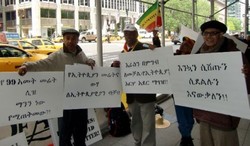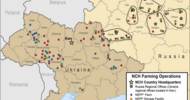IPS | 2 May 2012
by Anuradha Mittal, Jeff Furman,
The people and resources of Africa carry a centuries-long history of exploitation.
On the evening of April 24, following a daylong rally against large-scale land investment deals in poor nations, the Waldorf Astoria hotel in Manhattan became the venue for a 30-minute light show against land grabs in Africa.
Passersby stopped and watched, alongside members of the African diaspora, Occupy Wall Street affiliates and food and environmental justice groups, the illumination of the Park Avenue side of the hotel.
The crowd chanted: ‘Wall Street Out of Africa.’ ‘Starvation is not an Investment Strategy.’ ‘1.5 million Ethiopians Being Forcibly Relocated.’ Protesters wielding these ‘agriculture 101’ slogans were outside the Waldorf to get the message to the fund managers and investors inside, at the Global AgInvestment (GAI) Conference, seeking strategies to grow their monies through ‘ag-investment’ in poor nations.
So why this protest against the Global AgInvestment Conference?
The GAI conference is the premier agriculture investment event in the world. The 3,000-dollar admission tickets in New York were not for the small landholders from Africa but for institutional and global end investors and fund managers –all mulling over the economic opportunities agricultural lands have to offer. This year several retirement and pension funds, including the Alaska Retirement Board and the California State Teachers’ Retirement System, were in attendance.
Philanthropic institutions such as the Ford Foundation and Rockefeller Foundation were also present, along with the fund managers of endowments of several US universities, including Harvard, Princeton, Yale, and Tufts. And so was Lockheed Martin Investment Management Company.
Mouthwatering promises
GAI provides a platform from which fund managers connect with potential investors and make mouthwatering promises. For instance, at one such event, Susan Payne, current CEO of EmVest and ex-CEO of Emergent Asset Management, promised 20 to 40 per cent returns, hailing the low cost of African land as ‘an arbitrage opportunity.’ Lured by such promises, Harvard University and Vanderbilt University both invested in the fund in the past.
While billed as an ‘ag-conference’, ensuring food or water security are not GAI’s concerns. For instance, the first question the water session addressed was, “What are the real economic opportunities in water now?” Not surprising, then, that in 2009 alone, nearly 60 million hectares of land, over 75 per cent of it in Africa, were leased or bought by foreign investors.
The conference organisers and attendees claim that while they seek to make profits, their investments will result in improved livelihoods, job creation and food security. However, an examination of over 50 land deals in several African nations, conducted by the Oakland Institute, revealed that land and agriculture investments, touted as development opportunities for host nations, actually come with high costs to local communities.
Some of what our research uncovered includes the displacement of hundreds of thousands of small farmers, the diversion of water without environmental impact studies, the use of unsustainable farm practices, the failure to meet job creation and other promises, and special tax and other financial incentives so that the financial returns can be met.
As awareness around the impacts of such investments grows, people are taking action. Occupy Harvard and other student groups have called for Harvard to divest from Emergent. Vanderbilt’s Fair Food Coalition is asking for the same. Iowa State University has also buckled under media and student campaigns following the revelation of its involvement in a land deal in Tanzania, which would displace over 160,000 people.
It is not disputed that the people and resources of Africa carry a centuries-long history of exploitation. It is, therefore, incumbent on us to be vigilant regarding claims that any particular foreign profit-driven investment in Africa will benefit the African people.
Agreed renewed focus on agriculture is crucial and agriculture does need investment. However, the issue is not one of merely increasing budget allocations to agriculture, but rather one of promoting a model of agricultural development that honors and protects smallholder farmers and communities and their control and access to resources such as land and water.
Also, all such investment must be fully transparent and mechanisms to hold investors accountable must be firmly in place. The high economic returns promised at conferences such as the GAI come at a cost to the poor. Africa has already given more than enough.
by Anuradha Mittal, Jeff Furman,
The people and resources of Africa carry a centuries-long history of exploitation.
On the evening of April 24, following a daylong rally against large-scale land investment deals in poor nations, the Waldorf Astoria hotel in Manhattan became the venue for a 30-minute light show against land grabs in Africa.
Passersby stopped and watched, alongside members of the African diaspora, Occupy Wall Street affiliates and food and environmental justice groups, the illumination of the Park Avenue side of the hotel.
The crowd chanted: ‘Wall Street Out of Africa.’ ‘Starvation is not an Investment Strategy.’ ‘1.5 million Ethiopians Being Forcibly Relocated.’ Protesters wielding these ‘agriculture 101’ slogans were outside the Waldorf to get the message to the fund managers and investors inside, at the Global AgInvestment (GAI) Conference, seeking strategies to grow their monies through ‘ag-investment’ in poor nations.
So why this protest against the Global AgInvestment Conference?
The GAI conference is the premier agriculture investment event in the world. The 3,000-dollar admission tickets in New York were not for the small landholders from Africa but for institutional and global end investors and fund managers –all mulling over the economic opportunities agricultural lands have to offer. This year several retirement and pension funds, including the Alaska Retirement Board and the California State Teachers’ Retirement System, were in attendance.
Philanthropic institutions such as the Ford Foundation and Rockefeller Foundation were also present, along with the fund managers of endowments of several US universities, including Harvard, Princeton, Yale, and Tufts. And so was Lockheed Martin Investment Management Company.
Mouthwatering promises
GAI provides a platform from which fund managers connect with potential investors and make mouthwatering promises. For instance, at one such event, Susan Payne, current CEO of EmVest and ex-CEO of Emergent Asset Management, promised 20 to 40 per cent returns, hailing the low cost of African land as ‘an arbitrage opportunity.’ Lured by such promises, Harvard University and Vanderbilt University both invested in the fund in the past.
While billed as an ‘ag-conference’, ensuring food or water security are not GAI’s concerns. For instance, the first question the water session addressed was, “What are the real economic opportunities in water now?” Not surprising, then, that in 2009 alone, nearly 60 million hectares of land, over 75 per cent of it in Africa, were leased or bought by foreign investors.
The conference organisers and attendees claim that while they seek to make profits, their investments will result in improved livelihoods, job creation and food security. However, an examination of over 50 land deals in several African nations, conducted by the Oakland Institute, revealed that land and agriculture investments, touted as development opportunities for host nations, actually come with high costs to local communities.
Some of what our research uncovered includes the displacement of hundreds of thousands of small farmers, the diversion of water without environmental impact studies, the use of unsustainable farm practices, the failure to meet job creation and other promises, and special tax and other financial incentives so that the financial returns can be met.
As awareness around the impacts of such investments grows, people are taking action. Occupy Harvard and other student groups have called for Harvard to divest from Emergent. Vanderbilt’s Fair Food Coalition is asking for the same. Iowa State University has also buckled under media and student campaigns following the revelation of its involvement in a land deal in Tanzania, which would displace over 160,000 people.
It is not disputed that the people and resources of Africa carry a centuries-long history of exploitation. It is, therefore, incumbent on us to be vigilant regarding claims that any particular foreign profit-driven investment in Africa will benefit the African people.
Agreed renewed focus on agriculture is crucial and agriculture does need investment. However, the issue is not one of merely increasing budget allocations to agriculture, but rather one of promoting a model of agricultural development that honors and protects smallholder farmers and communities and their control and access to resources such as land and water.
Also, all such investment must be fully transparent and mechanisms to hold investors accountable must be firmly in place. The high economic returns promised at conferences such as the GAI come at a cost to the poor. Africa has already given more than enough.













